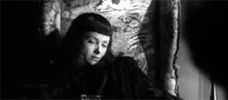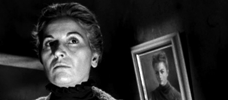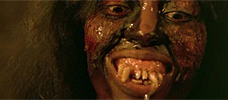Reviews
Gargoyle / Sangre canibal
Claire Denis
France / Germany / Japan, 2001
Credits
Review by Leo Goldsmith
Posted on 20 October 2009
Source Panorama DVD
Categories 31 Days of Horror VI
You were in love with her?”
“It’s not the right word for it.”
From the first languorous moments of Trouble Every Day, when Agnès Godard’s camera lingers on a couple (who never reappear in the film) making out in the backseat of a car, we recognize this as a film about love, albeit an unusual kind of love—anonymous, rapacious, and terrifyingly intimate. Later, more terror, more rapacious intimacy, awaits in the face (and teeth) of Béatric Dalle’s Coré as she smiles longingly at a lorry driver on an abandoned roadside. We hear her breathe hard through her nostrils, and we are once again uncomfortably close to our subject, as we so often are in Claire Denis’s films. This prelude suggests prostitution, but the aftermath tells a different story: Alex Descas’s Léo later finds his wife in the grasses a little way from the road. She is crouched like an animal, covered in the blood of the driver, whose body lies stiff and mutilated nearby. Léo grimly undertakes the task of bringing his wife home, cleaning her up, putting her to bed. While the (truly anonymous) prologue introduces the subject of sensuality, this sequence places us in a still more uncertain place, a complex world of both marital equilibrium and macabre horror-movie excess.
Claire Denis seems at once unlikely and ideal as the director for a horror film. On the one hand, she seems incapable of making a purely genre film; on the other, no film director in the world more gracefully explores the physical, more pointedly employs cinema to trace the ambiguities of body, persona, and landscape. In this way, a vampire film, with its themes of metamorphosis and the alien nature of appetites is perfectly suited to her abilities as a filmmaker, even if she is unlikely to satisfy our own appetites for genre pleasure. In Trouble Every Day, there are few genre signifiers to reassure us of the presence of that strong moral center so (paradoxically) common to horror films, and the narration of events is characteristically obtuse, reliant on gesture rather than dialogue.
But there are other pleasures, and while many have doubted the potency of Denis’s film - indeed, its reception at Cannes was very negative, especially after the acclaim that attended Beau Travail - few would argue against the beauty of its score. Tindersticks, Denis’s longtime collaborators, offer here a musical accompaniment that mixes harp with brass, vocals with piano, swooning string melodies with pregnant, tension-building caesuras. It is by turns operatic, delicate, minimalist, and voluptuous, and it’s a tribute to the sensitivity and unexpected subtlety of both Denis’ film and Tindersticks’ music that, on closer inspection, when one gets under the film’s fleshy surface, many of these adjectives fit the film and its music alike.
Even so, for all its delicacy, this is a film about vampires—or at very least about cannibals. True to such themes, Denis gives us intimations of perverse sexuality (including necrophilia and various means of penetration), seduction and surrender, metamorphoses both physical (human to bat, for example) and psychological (Jekyll and Hyde, etc.), and uncontrollable animalistic urges. These ideas in the vampire-film lexicon are usually linked to themes of decadence, and vampires are often always empathetically, tragically associated with disease (tuberculosis, formerly; AIDS these days), addiction, foreignness, and even consumerism. But in this opening scene, Denis presents the wild-animal figure of Dalle’s succubus almost naturalistically, with a flat, yet chilling lack of what is often so luridly pleasurable about genre depictions of grand guignol violence. There is the build-up and the gory results, but we do not, as yet, get the bloody money-shot which we are anticipating.
If, in Coré and Léo, Denis depicts a complicity between husband and wife, the newlywed American couple of Dr. and Mrs. Brown functions as a kind of counterexample. Shane and June arrive in Paris on their honeymoon, but not before we share in Shane’s internal crisis: his feverish visions of his otherwise beatific ingénue of a wife, splashing about in gallons of blood. Godard’s camera is merciless and leering: we inhabit Shane’s fantasies and June smiles back at us in a state of drowsy post-coital bliss, her back, arms, face, and ass awash with tiny rivulets of blood that soak the sheets she has curled up in. Back in the real world, they cuddle and toast their new marriage (“I’m happy. Are you happy? I’m happy”), but they are a sham of normalcy, right down to their oft-repeated wholesome-sounding American surnames. Portrayed by Vincent Gallo - whose gaunt, ghastly appearance, flat affect, vacant stare, and unexpectedly gentle voice Denis exploits fully - Shane does not make for a wholly convincing pharmaceutical executive, with his scruffy hairdo and semi-Hungarian mustache, but he is a pitiable and terrifying presence nonetheless. His every move is slow, yet unpredictable, and he carries himself with a strange mix of mesmerizing sexual magnetism, dead-eyed coldness, and adolescent uncertainty. He eyes the neck of the chambermaid; he buys a puppy; he molests a woman on the Métro; he tells his sleeping wife that he likes her, that he will never hurt her.
Like Denis’s I Can’t Sleep, another film that coyly evades genre trappings, Trouble Every Day unfolds in seemingly unstructured quotidian (or everyday) episodes. Characters arrive, depart, and overlap. Parallel stories coincide almost haphazardly, in a way that seems almost beside the point of - rather than predetermined by - the narrative. As in the earlier film, even the setting seems mutable: Denis at first toys with a gothic Paris of commonplace gargoyles and glittering canals, the Paris of Feuillade, with a Seine that reflects the blood and fire of the streetlights on its amorphous surface. But this imagery contrasts with a tourist’s Paris (of sightseeing at Notre Dame, of June’s haute couture-shopping), with the anonymous suburban enclaves so redolent of Franju’s films, and with the grey, liminal grasslands beyond, where Coré finds her prey.
Paris becomes, then, an unstable cityscape whose fractured representation stems more from internal than external terrors: the dark, malevolent of the corridors of the hotel or of Coré’s decayed, gated prisonhouse hide their own horrors, but then so do the bright interiors of an airplane or the fluorescent laboratories where centrifuges and flask rotors whiz test-tubes around with sickening regularity. (Perhaps unsurprisingly, Denis and Godard have identified the tense, spacious photography of Jeff Wall as an inspiration for the look of Trouble Every Day over that of any horror film.) For much of the film, we are focalized through the feverish delirium of Shane as he seeks out Léo and hopefully a cure for his illness, and for Shane - several times removed as pariah, as tourist, as Vincent Gallo - everyone and everything represents trouble, temptation, evil.
True to the conventions of horror films, this evil is of course associated with sex, and Denis masterfully uses cinema to seduce us - in essence, like a vampire - drawing us in with voyeuristic close-ups of the couple in the car, June’s pubic region as she lies in the bath, a man’s armpit and a nipple. Many of these scenes teeter on the precipice, eerily hinting at violent urges restrained, but twice, and quite abruptly, Denis allows her characters to consummate their bloodlust. Scenes of anonymous sex metamorphose into agonizing, carnivorous mutilations, sexual feasts in which oral pleasure is literalized as an animalistic devouring and the petit mort of orgasm as a sapping of another’s energy is made excruciatingly naturalistic as vampiric bloodletting. Coré eats parts of her lover’s face, licks him like a dog, and playfully fingers a hole she has made in his flesh. In a final, utterly sickening, yet boldly performed set-piece, Shane gives into his passions in a grueling rape-murder scene that begins with dangerous flirtation and vague notions of consensuality, then plunges into unfettered brutality.
But what’s most disturbing about Trouble Every Day is not the tragedy of Shane’s surrender to his “disease,” but his acceptance of it as a condition of his existence. Washing off the blood of his victim, he seems to feel better and tells his wife that he is ready to go home. The principal metaphor Denis seems to be exploring here is thus not so much of disease or even abject sexuality as it is about the conditions of intimacy, physical and marital. Both Léo and June have to manage spouses whose appetite for a certain abject form of sexual pleasure threatens to destroy them all: Leo tends to Coré’s escapades, tracking her down, cleaning her up; June attempts to satisfy Shane sexually, but realizes there is a limit, that there is more that he needs or desires. The metaphor is not finally about a vampire’s exertion of will or power over his victim, but more about the inadvertent draining that happens in a relationship. Shane fears that he will hurt June, that he will tear her apart, that his sexual desire will destroy his wife. It is a metaphor for intimacy and its dangers: letting another person into your life whom you may destroy or who may destroy you. His transgression - even his infidelity, such as it is - is not an emotional one, but a masturbatory one (hence the sequence in which Shane disengages from sex with June in order to masturbate copiously in the bathroom). Vampirism is a desire to possess, even to preserve, as much as it is to murder and consume, and this fundamental paradox is linked here to both marriage and casual dalliances. Few images are more chilling, even sickeningly melancholy, than the almost loving, playful kisses that Core and Shane give their victims once they have started to feed on them: bloody kisses for their lovers as they drift into death, woozy from shock and blood loss. But there is a bizarre tenderness here, echoed in Leo’s sponging of another man’s blood off his wife’s body and in June’s final embrace of her husband after he has cleaned himself of his crime.
More 31 Days of Horror VI
-

From Beyond
1986 -

The Haunting
1963 -

Killer Klowns from Outer Space
1988 -

Shock ‘Em Dead
1991 -

Critters
1986 -

Critters 2
1988 -

The Fall of the House of Usher
1928 -

Jonestown: The Life and Death of Peoples Temple
2006 -

In the Mouth of Madness
1994 -

Winterbeast
1991 -

Black Roses
1988 -

Needful Things
1993 -

The Seventh Victim
1943 -

A Page of Madness
1926 -

Holocaust 2000
1977 -

The Man and the Monster
1958 -

The Texas Chainsaw Massacre 2
1986 -

Trick or Treat
1986 -

Single White Female
1992 -

Trouble Every Day
2001 -

The Hands of Orlac
1924 -

The Devil’s Advocate
1997 -

Nocturne
1998 -

Hardware
1990 -

Hard Rock Zombies
1985 -

The Slumber Party Massacre
1982 -

Saw VI
2009 -

Zombi 4: After Death
1988 -

The Uninvited
1944 -

Hausu
1977
We don’t do comments anymore, but you may contact us here or find us on Twitter or Facebook.



